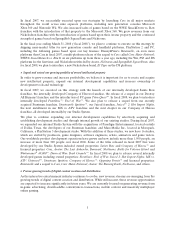THQ 2007 Annual Report Download - page 21
Download and view the complete annual report
Please find page 21 of the 2007 THQ annual report below. You can navigate through the pages in the report by either clicking on the pages listed below, or by using the keyword search tool below to find specific information within the annual report.
13
do. Accordingly, these competitors maybeable to market their products more effectivelyor make larger
offers or guarantees in connection with theacquisition of licensed properties. As competition for popular
properties increases, our cost of acquiring licenses for such properties may increase, resulting in reduced
margins.
Competition for shelf space. As competitors in our industry strive to release more blockbuster titles and as
retailersmerge, competitionfor retail shelf space may become more intense. We may need to increaseour
marketing expenditures to maintain sales of our titles. Increased expenses without corresponding increased
sales couldreduce our profit margins and thus have a negative effect on our business and financial results.
Competition with emerging forms of home-based entertainment may reduce sales of our products.
We also compete withother forms of entertainmentandleisure activities. Forexample,we believe the
overall growth in the useof the internet and online services by consumers may pose acompetitive threat if
customers andpotentialcustomers spend less of theiravailable time using interactive entertainment
software and more usingthe internet and onlineservices.
Competition for qualified personnel is intense in the interactive software entertainment industry and
failure to hire and retain qualified personnel could seriously harm ourbusiness.
We rely to a substantial extent on the management, marketing, sales, technical and software development
skills of alimited number of employees to formulate and implement our business plan. Our success
depends to a significant extent upon our ability to attract and retain key personnel.Competition for
employees can be intense and the process of locating keypersonnel with the right combination of skills is
often lengthy. The loss of services of keypersonnel couldhave a material adverse effect on our business.
Consolidation in the interactive software entertainment industry presents challenges withrespect to
resources and integration of acquired businesses.
Consistent with ourstrategy to expand our internaldevelopment capabilities anddistribution channels, we
intend to continueto pursue acquisitions of companies, intellectual property rights and other assets that
can be acquired on acceptabletermsandwhich we believe can be operated or exploited profitably. As our
industry continues to consolidate, we face significant competition in making acquisitions, which may
constrain our ability to complete suitabletransactions.
Further, as we acquire companies,we are faced with additional challenges.The integration of newly
acquired companies’ operationswith our existing operations takes management time and effort.
Additionally, there is a risk of loss of key employees,customers and vendors of therecently-acquired
companies.
Emerging technologies, such as games for wireless devices, require investments and present manyrisks.
Wireless network and mobile phone technologies are undergoing rapid innovation. New mobile phones
with more advanced processors and supportingadvanced programming languages continue to be
introduced in themarket. We have no control over thedemand for, or success of, theseproducts.
However, if we fail to anticipate and adaptto theseand other technologicalchanges, our market share and
our operatingresults may suffer. Our future success in providing wireless games and other content will
depend on our ability to adapt to rapidly changing technologies, develop applications to accommodate
evolving industry standards and improve the performance and reliability of ourapplications. In addition,
the widespread adoption of networking or telecommunications technologies or othertechnological
changes could require substantial expenditures to modify or adapt ourentertainment applications.
























